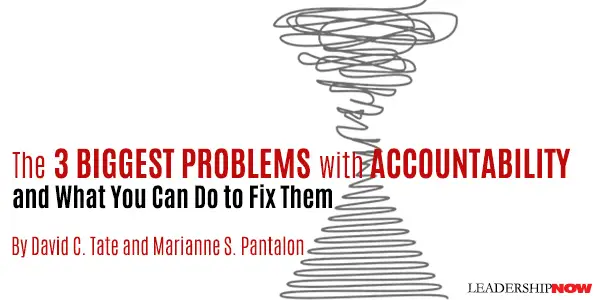 |
 |
12.16.22

The 3 Biggest Problems with Accountability and What You Can Do to Fix Them
ACCOUNTABILITY is essential for human systems to function. Whether you’re talking about governments, companies, sports teams, or families, accountability is what ensures that things run smoothly and that progress continues. But oftentimes, problems exist with how accountability is understood and how it’s enacted that make it ineffective or even counterproductive. An awareness of the limitations of traditional notions of accountability can help leaders bring about a more inspiring, supportive, and transformational version of accountability. Theodore Roosevelt once said, “If you could kick the person in the pants responsible for most of your trouble, you wouldn’t sit for a month.” This humorous observation holds some truth, but it’s also emblematic of a more traditional approach to accountability — with some inherent flaws. Here are the major limitations of traditional notions of accountability: Results only: The primary goal is achieving task or performance results. Did you do what you were supposed to do? Did you hit your numbers this quarter? While results are certainly important, focusing solely on performance outcomes may lead to ignoring other, equally important aspects of what it means to be effective in the long run —things like better relationships and learning. It also yields a binary, “pass/fail” approach to evaluating outcomes, which can be discouraging and limit what you can learn from it. Focus on individuals: Traditional accountability emphasizes individual responsibility. Individual responsibility is a vital aspect of accountability, but it runs the risk of people looking at situations through the lens of themselves only and missing the larger, collective goals. At worst, it can result in people developing a “that’s not my job” mentality, which can seriously undermine morale, capacity, and results. Blame-oriented: When something goes wrong, oftentimes, the first question asked is, “Who needs to be held accountable?” This kind of backward-looking accountability focuses on apportioning blame and punishment — who needs to be “kicked in the pants?” But in the majority of circumstances, making mistakes or failing to produce are not black-and-white situations for reprisal. They can actually represent learning moments. A blame orientation induces fear and leads to people covering up problems and avoiding more robust discussions of shortcomings, resulting in lost opportunities for learning, growth, and improvement in the long run. The upshot of these limitations is that they undermine the power of accountability as a force for excellence, connection, and learning. These problems turn accountability into something that’s essentially transactional: “Focus on the result, do your part, and don’t mess up!” This approach is limited because it’s more narrow, sterile, and even fear-invoking. It leaves a lot of possibilities on the table. So what’s the solution? Here are three strategies for taking a different approach to accountability that will allow you to capture the upsides of strong accountability while sidestepping the pitfalls. 1. Focus on people and results Instead of emphasizing just the task-related outcomes you’re aiming for, make sure you also pay attention to people’s experience in working towards those outcomes. How do you want people to feel about themselves and each other as a function of their work together? How do you want people to grow during that process? And when reflecting on the question of “How well did we do?” make sure you make space to consider how team members experienced the process, how relationships were affected, and how much people learned. 2. Make accountability a team sport Broaden the frame of accountability to go beyond what individuals are responsible for to create a collective sense of responsibility for meeting the team’s goals. Talk about what that means — whether that’s covering for other team members, helping others achieve their goals, sharing information and resources, soliciting others’ feedback, and being able to see the big picture. Everyone must be accountable to themselves but also to each other, as well as shared groups of stakeholders (customers, suppliers, investors, and the public). 3. No matter what happens, look for the learning Have a growth mindset that sees failures, errors, and setbacks as important opportunities for growth. When problems occur, instead of focusing on who was at fault, determine who is responsible for improving the situation, what can be learned from what happened, and what you’ll do differently next time. Normalize the fact that things sometimes go wrong by talking about your own mistakes and what you’ve learned from them. Done differently, accountability could be something that’s transformational, creating a mindset in which everyone takes responsibility for both individual and collective goals, no one wants to let anyone else down, and people are continually learning and improving. As a result, accountability changes from creating dread and worry to promoting vibrancy, engagement, and connection.  
Posted by Michael McKinney at 07:21 AM
|
BUILD YOUR KNOWLEDGE
 

How to Do Your Start-Up Right STRAIGHT TALK FOR START-UPS 
Grow Your Leadership Skills NEW AND UPCOMING LEADERSHIP BOOKS 
Leadership Minute BITE-SIZE CONCEPTS YOU CAN CHEW ON 
Classic Leadership Books BOOKS TO READ BEFORE YOU LEAD |